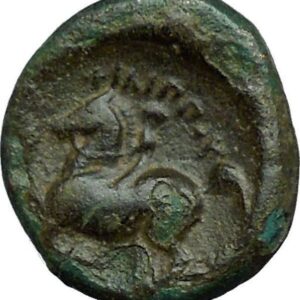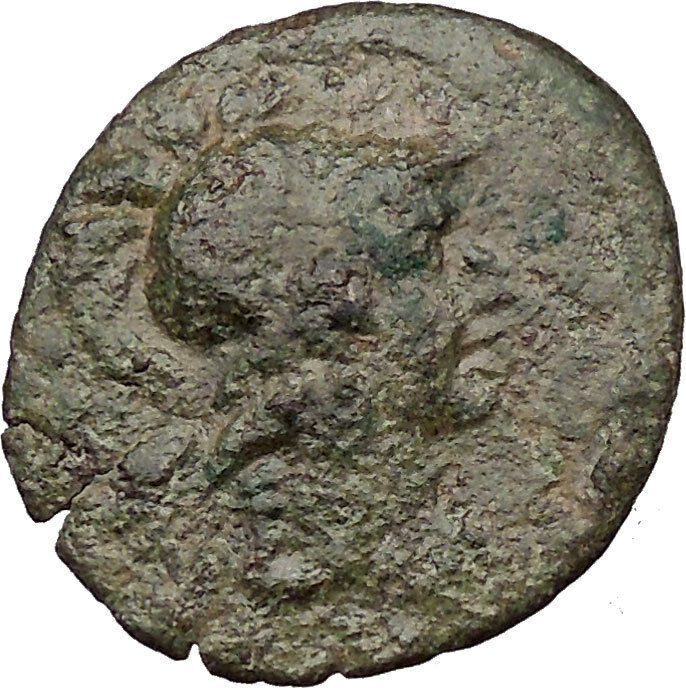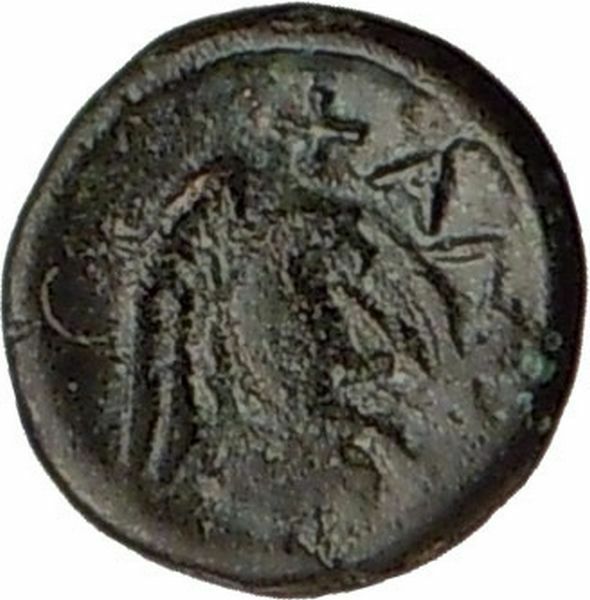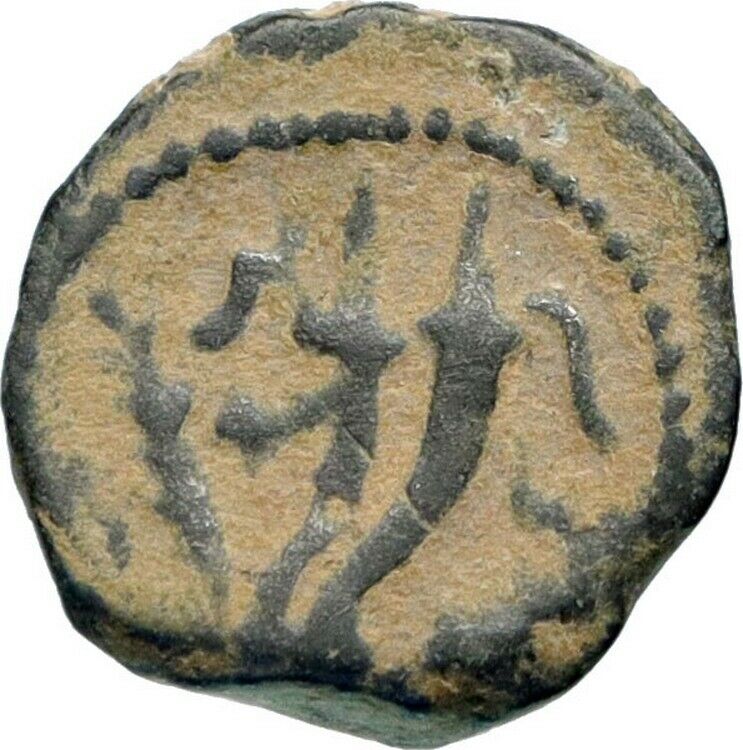|
Seleukid Kindom
Antiochos II Theos – King:
261-246 B.C.
Bronze 21mm (9.76 grams) Struck 280-261 B.C.
Reference: HGC 9, 253; SC 520, 522-527, and 537-538
Laureate head of Apollo right.
ΒΑΣΙΛΕΩΣ / ANTIOXOY either side of tripod; anchor
in exergue; monograms in field to left and right.
You are bidding on the exact item pictured,
provided with a Certificate of Authenticity and Lifetime Guarantee of
Authenticity.
A sacrificial tripod is a three-legged piece of religious furniture
used for offerings or other ritual procedures. As a seat or stand, the
tripod
is the most stable furniture
construction for uneven ground, hence its use is universal and ancient. It is
particularly associated with
Apollo
and the
Delphic oracle
in
ancient Greece
, and the word “tripod” comes
from the Greek meaning “three-footed.”

Apollo and
Heracles
struggle for the Delphic
tripod (Attic
black-figure
hydria
, c. 520 BC)

In
Greek
and
Roman mythology
,
Apollo,
is one of the most important and diverse of the
Olympian deities
. The ideal of the
kouros
(a beardless youth), Apollo has been
variously recognized as a god of light and the sun; truth and prophecy;
archery
; medicine and healing; music, poetry,
and the arts; and more. Apollo is the son of
Zeus and Leto
, and has a
twin
sister, the chaste huntress
Artemis
. Apollo is known in Greek-influenced
Etruscan mythology
as Apulu. Apollo was
worshiped in both
ancient Greek
and
Roman religion
, as well as in the modern
Greco
–Roman
Neopaganism
.
As the patron of Delphi
(Pythian Apollo), Apollo was an
oracular
god — the prophetic deity of the
Delphic Oracle
. Medicine and healing were
associated with Apollo, whether through the god himself or mediated through his
son Asclepius
, yet Apollo was also seen as a god
who could bring ill-health and deadly
plague
as well as one who had the ability to
cure. Amongst the god’s custodial charges, Apollo became associated with
dominion over
colonists
, and as the patron defender of herds
and flocks. As the leader of the
Muses (Apollon Musagetes) and director of their choir, Apollo
functioned as the patron god of music and
poetry
.
Hermes
created the
lyre for him, and the instrument became a common
attribute
of Apollo. Hymns sung to Apollo were
called paeans
.
In Hellenistic times, especially during the third century BCE, as Apollo
Helios he became identified among Greeks with
Helios
,
god of the sun
, and his sister Artemis
similarly equated with
Selene
,
goddess of the moon
. In Latin texts, on the
other hand, Joseph Fontenrose declared himself unable to find any conflation of
Apollo with
Sol
among the
Augustan poets
of the first century, not even
in the conjurations of
Aeneas
and
Latinus
in
Aeneid
XII (161–215). Apollo and Helios/Sol
remained separate beings in literary and mythological texts until the third
century CE.
Antiochus II Theos (Greek:
Ἀντίοχος Β΄ ὁ Θεός; 286–246 BC) was a
Greek king of the
Hellenistic
Seleucid Empire
who reigned from 261 to 246 BC.
He succeeded his father
Antiochus I Soter
in the winter of 262–61 BC.
He was the younger son of Antiochus I and princess
Stratonice
, the daughter of
Demetrius Poliorcetes
.
He inherited a state of war with
Ptolemaic Egypt
, the “Second
War“, which was fought along the coasts of
Asia Minor
, and the constant intrigues of petty
despots and restless city-states in Asia Minor. Antiochus also made some attempt
to get a footing in Thrace
. During the war he was given the title
Theos (Greek:
Θεός, “God”), being such to the Milesians
in slaying the tyrant
Timarchus
.
During the time Antiochus was occupied with the war against Egypt,
Andragoras
, his satrap in
Parthia
, proclaimed independence. According to
Justin
‘s epitome of
Pompeius Trogus
, in
Bactria
, his satrap
Diodotus
also revolted in 255 BC, and founded
the
Greco-Bactrian Kingdom
, which further expanded
in India in 180 BC to form the
Indo-Greek Kingdom
(180–1 BC). Then about 238
BC,
Arsaces
led a revolt of the
Parthians
against Andragoras, leading to the
foundation of the
Parthian Empire
. These events would have cut
off communications with India.
Phylarchus
relays current scandals regarding
his drunken banquets and liaisons with unsuitable young men.
About this time, Antiochus made peace with
Ptolemy II Philadelphus
, ending the Second War.
Antiochus repudiated his wife
Laodice I
and exiled her to
Ephesus
. To seal the treaty, he married
Ptolemy’s daughter
Berenice
and received an enormous dowry.
During her stay in Ephesus, Laodice I continued numerous intrigues to become
queen again. By 246 BC Antiochus had left Berenice and their infant son
Antiochus, in Antioch
to live again with Laodice I in Asia
Minor. Laodice I took the occasion to poison Antiochus while her partisans at
Antioch murdered Berenice and their infant son. Antiochus was buried in the
Belevi Mausoleum
.
Laodice I then proclaimed Seleucus II as King. With his cousin-wife Laodice
I, Antiochus had two sons:
Seleucus II Callinicus
,
Antiochus Hierax
and three daughters: Apama,
Stratonice of Cappadocia
and
Laodice
.
Relations with India
Antiochus is mentioned in the
Edicts of Ashoka
, as one of the recipients of
the Indian Emperor Ashoka
‘s
Buddhist
proselytism
:
- “And even this conquest [preaching Buddhism] has been won by the Beloved
of the Gods here and in all the borderlands, as far as six hundred
yojanas
(5,400-9,600 km) away, where
Antiochos, king of the Yavanas [Greeks] rules, and beyond this Antiochus
four kings named
Ptolemy
,
Antigonos
,
Magas
and
Alexander
rule.”
Ashoka also claims that he encouraged the development of
herbal medicine
, for men and animals, in the
territories of the Hellenistic kings:
- “Everywhere within Beloved-of-the-Gods, King Piyadasi’s [Ashoka’s]
domain, and among the people beyond the borders, the
Cholas
, the
Pandyas
, the Satiyaputras, the Keralaputras,
as far as
Tamraparni
and where the Greek king
Antiochos rules, and among the kings who are neighbors of Antiochos,
everywhere has Beloved-of-the-Gods, King Piyadasi, made provision for two
types of medical treatment: medical treatment for humans and medical
treatment for animals. Wherever medical herbs suitable for humans or animals
are not available, I have had them imported and grown. Wherever medical
roots or fruits are not available I have had them imported and grown. Along
roads I have had wells dug and trees planted for the benefit of humans and
animals.”
|










